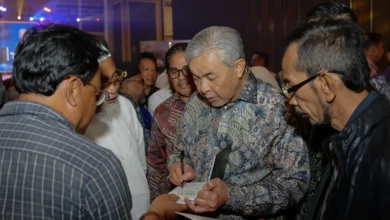Sabah launches padi, rice board to boost food self-sufficiency
Sabah launches padi, rice board to boost food self-sufficiency

KOTA KINABALU: Sabah aims to slash its dependence on imported rice with the launch of the Sabah Padi and Rice Board (SPRB), targeting a 30% food self-sufficiency level (SSL) by next year and 60% by 2030.
Chief Minister Datuk Seri Hajiji Noor said the revival of SPRB is part of the state government’s broader effort to enhance local food security and reduce reliance on rice imports.
“Currently, Sabah can only produce about 22.8% of its local rice demand, resulting in a high dependence on imports to meet it,” he said at the launch of SPRB and the Agrobank Padi Cultivation Takaful Scheme (STTP) at the Datuk Musbah Jamli Hall here Saturday (May 10).
He said SPRB will take over the development and management of padi from the State Agricultural Department starting this year.
“As the regulator for padi development and management, I urge all relevant state agencies to fully cooperate with SPRB,” Hajiji added.
DISYORKAN UNTUK ANDA :
- Keterangan Mahkamah Yang Berlainan Nada Antara Jasmin Loo Dan Roger Ng
- Apakah Akan Ada Pertandingan Jawatan Timbalan Presiden PKR?
- Maruah Negara Di Calar, Tanah Rakyat Di Jarah Tapi Hadi Tetap Sibuk Dengan Fatwa Politik
BN Menang Di Ayer Kuning, Tapi UMNO Masih Gagal Tangani Naratif UMDAP
Hajiji said the state government is also promoting hill padi cultivation as part of its efforts to boost SSL, with an estimated 13,266ha of hill land suitable for padi cultivation, involving 15,617 farmers.
“It is estimated that this area has the potential to produce 30,424 metric tonnes of hill rice annually,” he said, adding that like Sarawak’s famous Bario rice, Sabah has its own premium hill rice varieties, including Adan rice from Long Pasia, Sipitang, as well as from Ranau, Kudat, and Pitas, which have gained popularity locally.
To ensure a comprehensive approach to padi development, Deputy Chief Minister Datuk Seri Dr Jeffrey Kitingan, who is also state Agriculture, Fisheries, and Food Industry Minister, said the state government will focus on cultivation in six key districts – Kota Marudu, Tuaran, Tambunan, Keningau, Papar, and Kota Belud. These areas cover a total of 22,218ha, involving 16,018 padi farmers.
Hajiji also called on government-linked companies (GLCs) to develop idle land for padi cultivation, assuring that the state government remains committed to increasing local rice production.
He also encouraged farmers to take advantage of the Padi Cultivation Takaful Scheme, which covers Malaysian padi farmers aged 18 and above, farming in designated areas, registered under the Federal Government Fertiliser Scheme, and holding an Agrobank account.
DISYORKAN UNTUK ANDA :
- Cubaan Melucut Hak Milik UMNO Ke Atas PWTC Gagal
- Tragedi Letupan Putra Heights: KUSEL Dan MBSJ Di Serbu Audit
- Benarkah Melayu Sedang Terbangsat Di Bumi Sendiri
Persamaan Antara Makcik Maimun, Pakcik Hamid Dan Uncle Tommy
The launch of SPRB follows calls from activists and political groups in September 2023 to revive the board and boost rice production in the state, with suggestions for collaboration with district offices, advanced machinery, quality seeds, and financial support for farmers to increase productivity.
In April 2024, political movements reiterated the call, highlighting Sabah’s vast fertile lands and the potential to reduce reliance on imported rice.
Sabah launches padi, rice board to boost food self-sufficiency
DISYORKAN UNTUK ANDA :
- Sikiittt Lagi PAS Akan Sucikan DAP
- Ayuh Malaysia, Kita Merajuk
- Bila Kuasa Raja Raja Melayu Di Persoalkan Di Mahkamah
LAWATI LAMAN FACEBOOK KAMI :
Layari Laman Facebook MYKMU.NET
Implikasi Terhadap Kedaulatan Raja Melayu Sekiranya Mahkamah Menolak Titah Adendum






You must be logged in to post a comment.